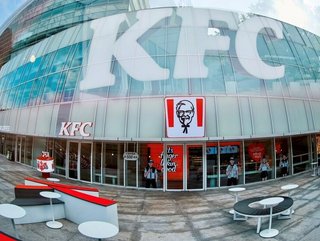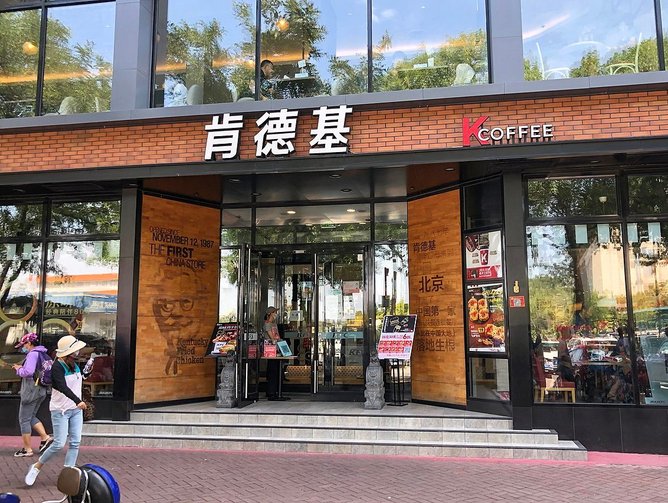Yum China’s Industry-Leading Recipe for Sustainable Success

When Yum China – the operator of KFC, Pizza Hut and Taco Bell in China – launched its senior-friendly KFC Super App in 2022, it set a benchmark for the restaurant industry globally.
The App, which features a simplified user interface designed for seniors and leverages AI to generate meaningful recommendations, reveals not only Yum China's ambition in driving growth, but its aspiration in promoting inclusion – a profit-meets-purpose innovation that is reflective of the company's approach to sustainable growth.
This is just one example of the industry-leading digital innovations that has propelled China’s largest restaurant operator to record growth – and to industry- and world-leading standards in ESG.
The Fortune 500 company, which was named to TIME100 Most Influential Companies in 2021, recently ranked number one in the world in ESG for the Restaurant and Leisure Facilities industry, taking top spot with the highest score among industry peers in the S&P Global 2023 Corporate Sustainability Assessment (CSA).
Described by Yum China CEO Joey Wat as “testament to our dedication to integrating sustainable practices across our operations”, this achievement adds to the increasing global recognition of the company’s game-changing sustainability efforts.

As the first restaurant company in China to receive Science Based Targets initiative (SBTi) approval for its near-term greenhouse gas emissions targets, Yum China is the only consumer services company from the Chinese mainland to be included in the Dow Jones Sustainability Indices (DJSI) World and the only restaurant company in the world to hold the AA MSCI ESG rating for two consecutive years.
Pretty impressive stuff, given the group’s vast operations and exponential growth over the last decade.
Sustainable growth for Yum Brands
From a single restaurant in 1987, China’s largest restaurant company now operates more than 14,100 restaurants across six brands in over 1,900 mainland cities spanning every province and region across mainland China.
As a spin-off of Yum Brands, listing on the NYSE in 2016 and the HKEX in 2020, the US$16.71 billion Yum China has seen its stock rise 60% in seven years – and in 2023, delivered consecutive record quarters in total revenue, operating profits, and net new store openings – logging a 9% YoY increase in revenues to US$2.91 billion for Q3 2023.
Bouncing back strongly post-pandemic, last month KFC opened its 10,000th China store, in Hangzhou, confirming its dominance as China’s biggest Western fast-food chain.
Currently serving over one-third of China’s 1.4 billion people, KFC is aiming to raise that to over half by 2026, according to Yum Brands CEO Joey Wat – with plans to accelerate net new openings to around 1,200 annually over the next three years.

While growth (and profits) is strong for Yum Brands, the company’s commitment to sustainable practices has not faltered – in fact, it has only grown stronger, as the many ESG endorsements prove.
In supporting the transition to a low-carbon and circular economy, the company is guided by its 4R Principles (Reduce, Reuse, Recycle and Replace) and has made meaningful progress on climate action, the renewable energy transition, and circular practices.
Among initiatives, the restaurant group has rolled out numerous pilot projects from fuelling its logistic fleets with biodiesel to recycling packaging waste generated in daily operations.
Recycled materials, such as ceramic floor tiles manufactured in the process of energy recycling, low-carbon bamboo materials, and leather alternative made from recycled KFC coffee grounds, have been applied to construction and furniture of the company's many KFC Green Pioneer Stores.
Food nutrition and safety is also important, and the fast-food business continues to invest heavily in technologies like AI, IoT, and real-time monitoring and analysis, to establish rigorous control measures across the value chain.
Renewable energy transition efforts
Committed to reaching net-zero by 2050, Yum China has set near-term SBTi-approved targets – to reduce absolute Scope 1 and 2 GHG emissions 63% by 2035, and to reduce Scope 3 GHG emissions from purchased goods by 66.3% per ton of goods purchased by 2035.
"The goals we set are truly ambitious and will require a lot of work and collaboration with stakeholders across the value chain," CEO Joey Wat previously said.
Which is why, in May 2023, the company launched a Distributed Photovoltaic and Virtual Green Power Purchase Alliance with 40 key suppliers – designed to drive low-carbon transformation across its entire value chain.
Ambitious in its goal to switch to renewables, Yum China opened the country’s first-ever 100% renewable cold-chain logistics centre last year – marking a significant milestone in the company's "ongoing renewable energy transition efforts in its restaurants and supporting facilities", Wat said in a company statement.
What's more, some 70 of the company’s restaurants in Zhejiang, Anhi, and Shanxi provinces are now net-zero – powered by 100% renewable energy and utilising a diverse mix of green power trading models. Among KFC Green Stores, for example, Yum China has installed solar panels on the roof of the green pioneer store in Hangzhou, while solar energy powered outdoor umbrellas generate electricity for night-time lighting and IoT, big data and AI is used to effectively reduce energy consumption by about 10% each year.
This gives Yum China an estimated total annual green power consumption of around ten million KW hours across logistics centres and restaurants within the company's operational control.
"We are committed to driving meaningful change and pioneering in the restaurant industry towards net-zero emissions," Wat said in a statement. "Building Green Pioneer Stores is an important part of our journey. We will continue to explore utilisation of innovative technologies in restaurant construction and operations to promote sustainable development as well as contribute to the low carbon economy."
Rural revitalisation – locally sourced produce and sustainable agriculture
Harnessing its strong supply chain management, Yum China is committed to rural revitalisation across China and delivers on this through its Grow Local Initiative, which promotes the use of locally sourced produce in its menu offerings – and in the provision of support and training to farmers.
Since the launch in 2018 of its Grow Local Initiative, Yum China has introduced high-quality local produce such as Yunnan truffles, Guizhou dragon fruits and Shaanxi apples.
KFC has added Dark Soy Milk made with Tartary buckwheat grown in the remote Liangshan region of Sichuan province, while more recently, Pizza Hut has launched a new pasta dish featuring citron daylily sourced from the Shanxi province.
To promote local agricultural products, Yum China has also utilised its e-commerce platforms to sell pomegranates from Yunnan province, Zigui oranges from Hubei province, and lemons from Sichuan province. And through initiatives such as its flagship One Yuan Donation, Digital Classroom, and Grow Local, the restaurant giant is empowering rural communities and strengthening local economies – contributing to poverty alleviation and improving the diet and nutrition of children in remote areas, while enhancing access to digital education.
In further embracing ethical practice, Yum China recently joined the United Nations Global Compact (UNGC), pledging to embed the UNGC’s principles in human rights, labour, environment and anti-corruption into its business strategy, corporate culture and daily operations.
*******************
Make sure you check out the latest edition of Sustainability Magazine and also sign up to our global conference series - Sustainability LIVE 2024.
*******************
Sustainability is a BizClik brand.






